北师大版(2019)必修第一册Unit 2 Sports and Fitness Writing Workshop 课件(共42张PPT,内镶嵌视频)
文档属性
| 名称 | 北师大版(2019)必修第一册Unit 2 Sports and Fitness Writing Workshop 课件(共42张PPT,内镶嵌视频) |  | |
| 格式 | pptx | ||
| 文件大小 | 7.6MB | ||
| 资源类型 | 教案 | ||
| 版本资源 | 北师大版(2019) | ||
| 科目 | 英语 | ||
| 更新时间 | 2023-09-08 10:15:22 | ||
图片预览

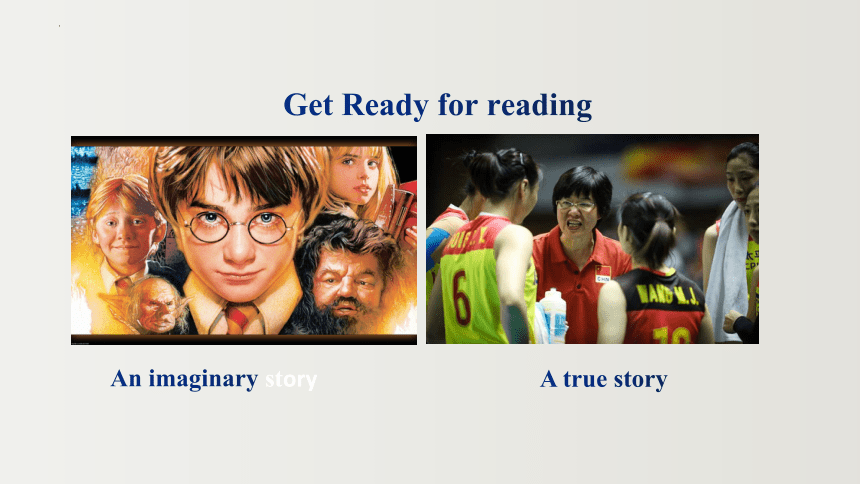
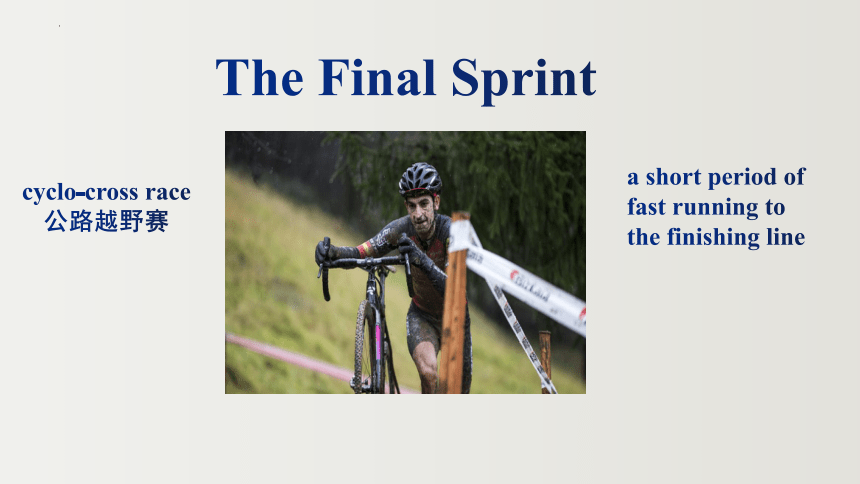
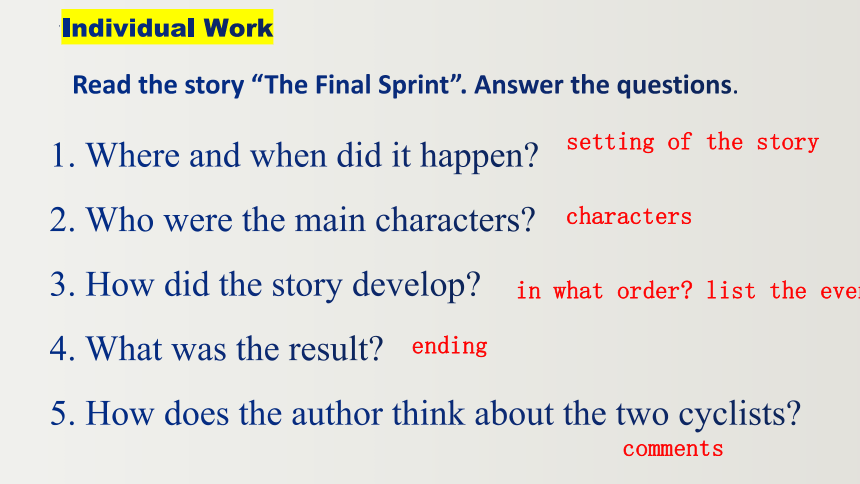
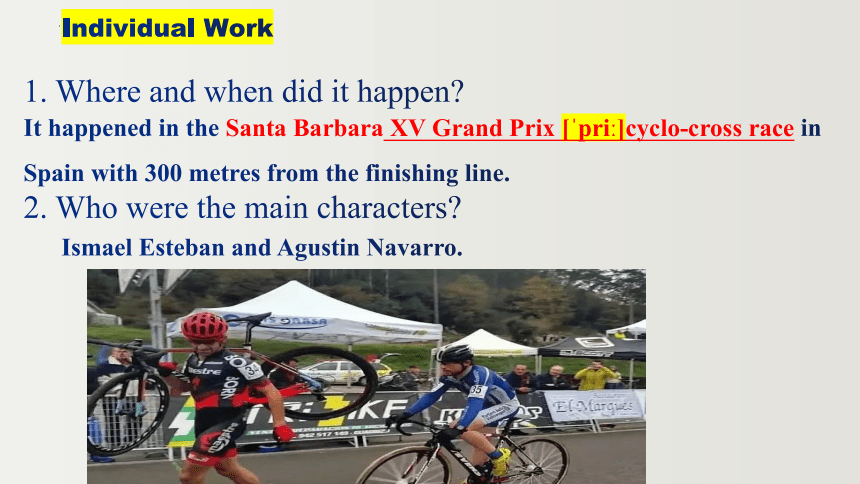
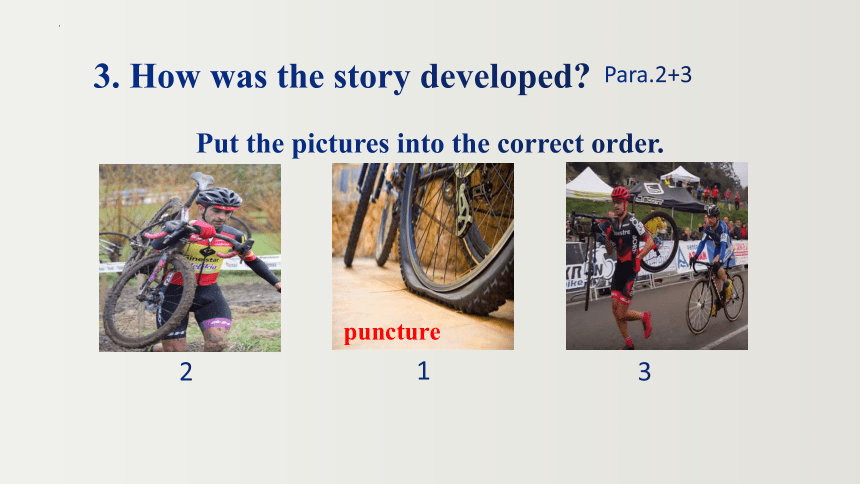
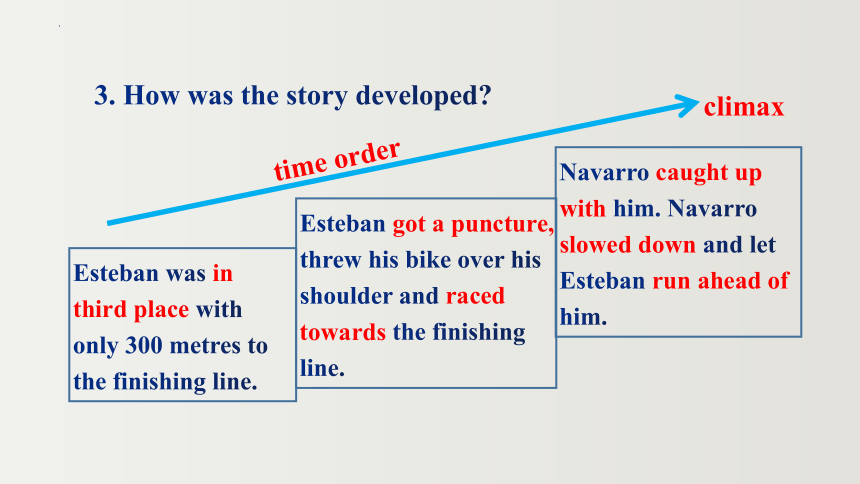
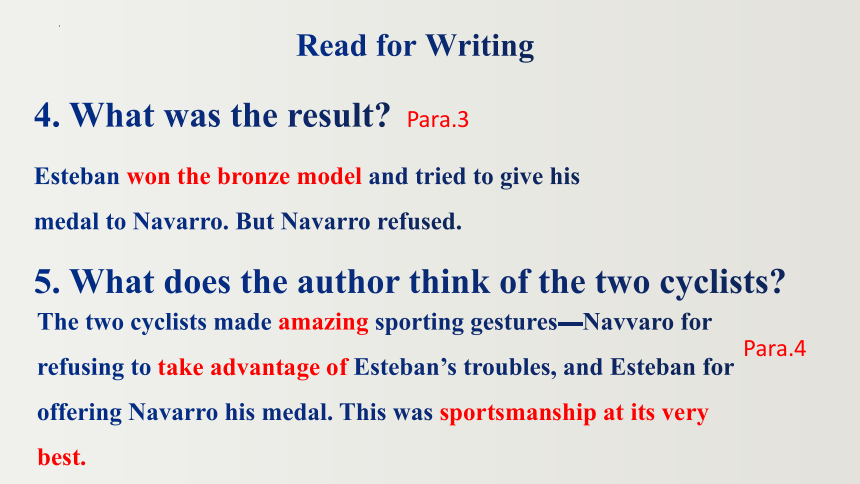

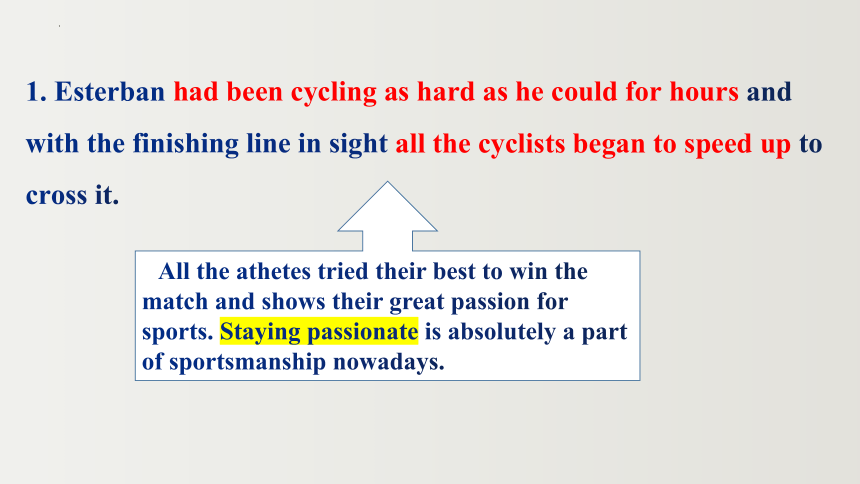
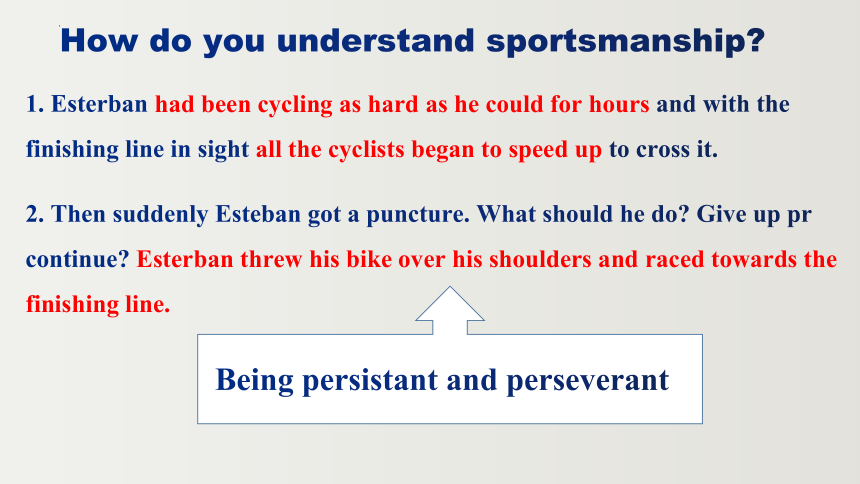
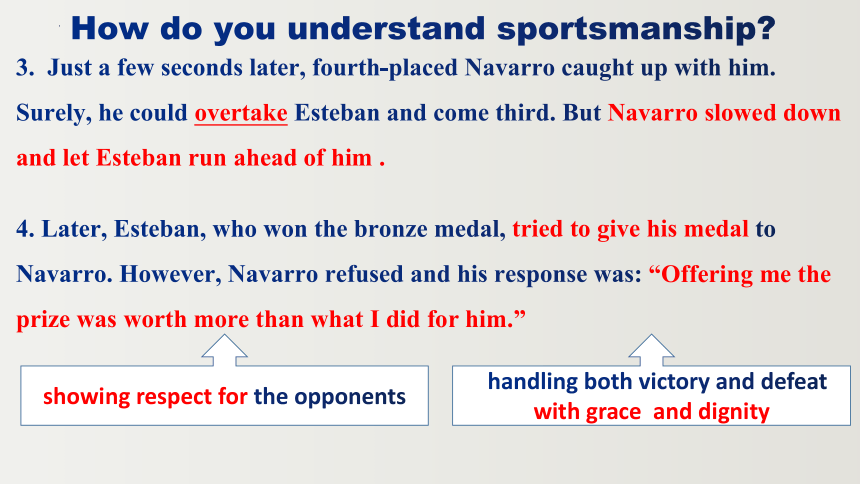
文档简介
(共42张PPT)
新北师大版高中英语必修一Unit2 Sports and Fitness
Writing Workshop--A True Story
An imaginary story
A true story
Get Ready for reading
The Final Sprint
cyclo-cross race
公路越野赛
a short period of fast running to the finishing line
Read the story “The Final Sprint”. Answer the questions.
1. Where and when did it happen
2. Who were the main characters
3. How did the story develop
4. What was the result
5. How does the author think about the two cyclists
setting of the story
characters
in what order list the events
ending
comments
Individual Work
1. Where and when did it happen
2. Who were the main characters
It happened in the Santa Barbara XV Grand Prix [ pri ]cyclo-cross race in Spain with 300 metres from the finishing line.
Ismael Esteban and Agustin Navarro.
Individual Work
Put the pictures into the correct order.
1
2
3
puncture
3. How was the story developed
Para.2+3
3. How was the story developed
Esteban was in third place with only 300 metres to the finishing line.
Esteban got a puncture, threw his bike over his shoulder and raced towards the finishing line.
Navarro caught up with him. Navarro slowed down and let Esteban run ahead of him.
climax
time order
Read for Writing
4. What was the result
Esteban won the bronze model and tried to give his medal to Navarro. But Navarro refused.
Para.3
5. What does the author think of the two cyclists
Para.4
The two cyclists made amazing sporting gestures---Navvaro for refusing to take advantage of Esteban’s troubles, and Esteban for offering Navarro his medal. This was sportsmanship at its very best.
How do you understand “sportsmanship” in this story
What might have been your choice if you were Navvaro Why
Group discussion
1. Esterban had been cycling as hard as he could for hours and with the finishing line in sight all the cyclists began to speed up to cross it.
All the athetes tried their best to win the match and shows their great passion for sports. Staying passionate is absolutely a part of sportsmanship nowadays.g
How do you understand sportsmanship
1. Esterban had been cycling as hard as he could for hours and with the finishing line in sight all the cyclists began to speed up to cross it.
2. Then suddenly Esteban got a puncture. What should he do Give up pr continue Esterban threw his bike over his shoulders and raced towards the finishing line.
Being persistant and perseverant g
How do you understand sportsmanship
4. Later, Esteban, who won the bronze medal, tried to give his medal to Navarro. However, Navarro refused and his response was: “Offering me the prize was worth more than what I did for him.”
3. Just a few seconds later, fourth-placed Navarro caught up with him. Surely, he could overtake Esteban and come third. But Navarro slowed down and let Esteban run ahead of him .
showing respect for the opponents
ghandling both victory and defeat with grace and dignity
5. Fans lined the road to the finishing line, cheering on the competitors.
6. The audience was amazed at his show of sportsmanship and cheered and clapped for the cyclists.
How do you understand sportsmanship
Fans and audience’s staying positive during the competitions
My understanding of sportsmanship
1. cooperating with your teamates and staying positive all the time
2. following the rules and playing fair
3. respecting the judgement of the referees and the opponents
1. server
2. chief spiker: 主攻手
3. jump service:跳发
4. receive the service
5. be bound to win
6. get injured
本单元的写作任务是写一则故事。描写故事属于记叙文的范畴,在写记叙文的过程中要牢记记叙文的六要素:时间、地点、人物、事件的起因、经过和结果。在写作时具体注意以下几个方面:
1.严格按照要求完成各个信息要点,注意故事的完整性。
2.常用的人称为第一人称和第三人称。用第一人称表示的是由叙述者亲眼所见、亲耳所闻的经历;用第三人称是以观察者的身份展开叙述;要根据具体情况合理选用。
Writing
3.正确运用时态。讲述已经发生的故事,记叙文的基本时态为一般过去时和过去进行时,但也要注意灵活运用其他时态。
4.在叙述事情时,可以采用顺叙、倒叙或插叙的叙述方式。在叙述过程中要重视句子间的衔接,用好过渡语。
常用表达
1.交代时间的常用表达:
one day;the other day;last week;when I was...years old;a long time ago;on a dark,rainy night;on the weekend;once upon a time;during the summer holidays...
2.交代地点的常用表达:
on the way to school;on the way home;at the crossing;at the foot of the mountain;at the airport...
3.推动情节发展(事情经过)的典型句型:
(1)As scheduled,we set out at 7 o’clock in the morning and went back around 4 o’clock in the afternoon by bus.
按照安排,我们早上七点出发,下午四点坐公交返回。
(2)The moment I appeared on the stage,the audience cheered with wild applause.
我一上台,观众们就热烈地鼓掌。
(3)I was walking along the park when I caught sight of an old man pushing a wheelchair with difficulty.
我正在公园散步,突然看到一位老人正吃力地推着轮椅。
(4)Hardly had we arrived at the destination when we set out to fulfill the task.
我们一到达目的地就开始工作。
(5)Not until then did we realize the importance of helping each other.
直到那时我们才意识到相互帮助的重要性。
4.介绍故事的结果或谈自己的感想
(1)Personally,I think that...
我个人认为……
(2)What surprised/attracted/delighted us most was that...
最让我们惊讶/感动/高兴的是……
(3)Tired as we were,we had a sense of achievement.
尽管我们很累,但是有一种成就感。
(4)Through this meaningful activity,we learned something that can’t be learned in class.
通过这次有意义的活动,我们学到了课堂上学不到的东西。
(5)What an unforgettable experience!
真是一次难忘的经历啊!
(6)Through the activity,not only do we better understand our traditional culture but we also broaden our international horizons.
通过这次活动,我们不仅更好地了解了中国传统文化,也拓宽了国际视野。
(7)With excitement,I couldn’t wait to share my pictures on WeChat Moments.
激动万分,我迫不及待地在朋友圈分享我的照片。
典例展示
假设你是红星中学高一(2)班的学生李华。右面四幅图描述了上周五你在放学路上,撞倒一位骑车老人并实施救助的过程。请根据图片的先后顺序,写一篇英文周记。
注意:1.词数80左右;
2.可以适当增加细节,以使行文连贯。
范文赏读
Last Friday was memorable for me because I had an unforgettable experience on that day.
After class that day,I rode my bike home as usual.Unfortunately,I knocked down an old man who was also riding a bike.The old man couldn’t stand up.There must be something wrong with his leg,so I called my mom immediately.We took the old man to the hospital at once.The doctor gave him a careful examination.Luckily,there was nothing serious.We were all relieved.
Then I went to have his bike repaired.The old man took his bike and we waved each other goodbye.The accident taught me a lesson:when riding a bike we should be more careful.
Esteban had been cycling as hard as he could for hours and with the finishing line in sight all the cyclists began to speed up to cross it.
埃斯特班尽最大努力骑了好几个小时了,终点线就在眼前,所有的自行车运动员开始加速通过终点。
1
sight n.视野;视力;景象
catch sight of看见
at first sight初次见到;乍看上去
at the sight of一看见……就……
come into sight 进入视野
in/within sight 在视野内,看得见
lose sight of看不见
out of sight看不见
Language Points
(1)He was about to give up when he caught sight of a car in the distance.
他正要放弃,这时他看到远处有辆车。
(2)The crying baby smiled its mother coming.
这个正在哭的婴儿一看到妈妈来了就笑了。
(3)Suddenly the driver the car he was following.
突然司机看不见他所跟随的车了。
(4)The old woman stood there until the train was .
老太太站在那里,直到火车驶出了视线。
at the sight of
lost sight of
out of sight
speed up (使)加速
at a speed of...以……的速度
at low/high/full/top speed以低/高/全/最高速
pick up speed加速
slow down减速
(1)The instructor kept repeating the words,“Speed up!” “Slow down!” “Turn left!”
教练重复着这些话:加速!减速!向左转!
(2)Modern inventions have sped people’s lives amazingly .
现代发明大大加快了人们的生活节奏。
(3)On the top of my house,I can see a train is going .
在我家的房顶上我可以看到火车正在高速行驶。
(4)Once outside the station,the train began to .
一出车站,火车就开始加速。
up
at high speed
speed up/pick up speed
Esteban had been cycling as hard as he could for hours and with the finishing line in sight all the cyclists began to speed up to cross it.埃斯特班尽最大努力骑了好几个小时了,终点线就在眼前,所有的自行车运动员开始加速通过终点。
with the finishing line in sight为“with+宾语+介词短语”构成的with复合结构,表示伴随、方式、条件、原因等。
其具体构成如下:
①with+宾语+介词短语
A young girl went in,with a book in her hand.
一个年轻女孩进来了,手里拿着一本书。
②with+宾语+形容词/副词/名词
He left in a hurry with the door open.
③with+宾语+现在分词(表示主动和动作正在进行)
With so much work filling in his mind,he couldn’t sleep well.
心里装着那么多工作,他睡不好觉。
④with+宾语+过去分词(表示被动或动作已完成)
The man was brought in with his hands tied behind his back.
这个人被带了进来,双手绑在身后。
⑤with+宾语+动词不定式(表示动作尚未发生)
With a lot of homework to do,I can’t go to the cinema with you.
有很多作业要做,我不能和你一起去看电影。
Just a few seconds later,fourth-placed Navarro caught up with him.
仅仅几秒钟之后,位列第四的纳瓦罗就追上了他。
2
catch up with追上;赶上
catch sb. doing sth. 发现某人正在做某事
catch sight of察觉;看见
catch hold of抓住
be caught in陷入;被卷入;遇上
e.g.They asked the driver to speed up to catch up with the truck.
他们让司机加速去赶上那辆卡车。
(1)The boy was caught (cheat) in the exam last week.
上周这个男孩被发现考试作弊了。
(2)I turned around and the beautiful bike.
我转过身来,看到了这辆好看的自行车。
(3)When the opportunity comes,he will it.
当机会来临时,他会抓住它。
(4)The man the traffic jam that day.
那天这个人遭遇了堵车。
cheating
caught sight of
catch hold of
was caught in
Navarro had let Esteban finish in third place,while he came fourth.
纳瓦罗让埃斯特班第三,而他得了第四名。
2
本句是while作并列连词连接的并列句,表示对比,意为“然而”。
while可用作从属连词,引导时间状语从句,意为“当……时候”
while可用作从属连词,引导让步状语从句,意为“虽然,尽管;只要”
while可用作名词,意为“一会儿”。
(1)I’m good at playing table tennis,while my brother is good at playing tennis.
我擅长打乒乓球,而我弟弟擅长打网球。
(2) I find her a little annoying,I often help her out.
虽然我觉得她有点烦人,我还是经常帮助她。
(3)The man found a hole he was traveling in the mountain.
这个人在山中旅行时发现了一个山洞。
(4)The girl worked in a bank before studying law.
这个女孩在学习法律之前在银行工作过一段时间。
While
while
for a while
The audience was amazed at his show of sportsmanship and cheered and clapped for the cyclists.观众们对于他所展现的运动精神感到震惊,为自行车选手们热烈地欢呼、鼓掌。
3
amazed adj.大为惊奇的,惊讶的
be amazed at sth. 对某事感到惊讶
be amazed to do sth. 对做某事感到惊讶
amaze vt.使惊讶
amazing adj.令人惊讶的
amazement n.惊奇
to one’s amazement让人惊奇的是
(1)The performance of the actor really made us amazed.
这位演员的表演确实让我们惊讶。
(2)All of us were amazed (see) him in this village.
看到他在这个村子里,我们都很惊讶。
(3)His (amaze) success made his parents very happy.
他令人惊奇的成功让他的父母很高兴。
to see
amazing
However,Navarro refused,and his response was:“Offering me the prize was worth more than what I did for him.”然而,纳瓦罗拒绝了,他的回答是:“他给我这个奖牌超过了我为他做的。”
4
response n.回答,答复
in response to回答……;回应……
make a/no response to对……做出/不做出回应
respond vi.回答;响应;做出反应
respond to回答……;回应……
(1)I suggested he work out a new plan but he didn’t make a response to it.
我建议他制定一个新计划,但是他没有回复。
(2)How did he respond the news about his personal life?
他对与他的私生活有关的消息是如何回应的?
to
The two cyclists made amazing sporting gestures—Navarro for refusing to take advantage of Esteban’s troubles,and Esteban for offering Navarro his medal.两位自行车手表现出了高度的体育精神——纳瓦罗拒绝利用埃斯特班碰到的麻烦,埃斯特班把他的奖牌给纳瓦罗。
5
take advantage of 利用
to one’s advantage对……有利
have an advantage over优于……,胜过……
at a disadvantage处于劣势
(1)They took advantage of the fine weather to play tennis.
他们利用好天气去打了网球。
(2)Now we can see the present situation is our advantage.
现在我们可以看到目前的形势对我们有利。
(3)My friend has an advantage me in chemistry.
我的朋友在化学方面比我有优势。
(4)This matter put our country a serious disadvantage.
这个事件使我们国家处于非常不利的地位。
to
over
at
新北师大版高中英语必修一Unit2 Sports and Fitness
Writing Workshop--A True Story
An imaginary story
A true story
Get Ready for reading
The Final Sprint
cyclo-cross race
公路越野赛
a short period of fast running to the finishing line
Read the story “The Final Sprint”. Answer the questions.
1. Where and when did it happen
2. Who were the main characters
3. How did the story develop
4. What was the result
5. How does the author think about the two cyclists
setting of the story
characters
in what order list the events
ending
comments
Individual Work
1. Where and when did it happen
2. Who were the main characters
It happened in the Santa Barbara XV Grand Prix [ pri ]cyclo-cross race in Spain with 300 metres from the finishing line.
Ismael Esteban and Agustin Navarro.
Individual Work
Put the pictures into the correct order.
1
2
3
puncture
3. How was the story developed
Para.2+3
3. How was the story developed
Esteban was in third place with only 300 metres to the finishing line.
Esteban got a puncture, threw his bike over his shoulder and raced towards the finishing line.
Navarro caught up with him. Navarro slowed down and let Esteban run ahead of him.
climax
time order
Read for Writing
4. What was the result
Esteban won the bronze model and tried to give his medal to Navarro. But Navarro refused.
Para.3
5. What does the author think of the two cyclists
Para.4
The two cyclists made amazing sporting gestures---Navvaro for refusing to take advantage of Esteban’s troubles, and Esteban for offering Navarro his medal. This was sportsmanship at its very best.
How do you understand “sportsmanship” in this story
What might have been your choice if you were Navvaro Why
Group discussion
1. Esterban had been cycling as hard as he could for hours and with the finishing line in sight all the cyclists began to speed up to cross it.
All the athetes tried their best to win the match and shows their great passion for sports. Staying passionate is absolutely a part of sportsmanship nowadays.g
How do you understand sportsmanship
1. Esterban had been cycling as hard as he could for hours and with the finishing line in sight all the cyclists began to speed up to cross it.
2. Then suddenly Esteban got a puncture. What should he do Give up pr continue Esterban threw his bike over his shoulders and raced towards the finishing line.
Being persistant and perseverant g
How do you understand sportsmanship
4. Later, Esteban, who won the bronze medal, tried to give his medal to Navarro. However, Navarro refused and his response was: “Offering me the prize was worth more than what I did for him.”
3. Just a few seconds later, fourth-placed Navarro caught up with him. Surely, he could overtake Esteban and come third. But Navarro slowed down and let Esteban run ahead of him .
showing respect for the opponents
ghandling both victory and defeat with grace and dignity
5. Fans lined the road to the finishing line, cheering on the competitors.
6. The audience was amazed at his show of sportsmanship and cheered and clapped for the cyclists.
How do you understand sportsmanship
Fans and audience’s staying positive during the competitions
My understanding of sportsmanship
1. cooperating with your teamates and staying positive all the time
2. following the rules and playing fair
3. respecting the judgement of the referees and the opponents
1. server
2. chief spiker: 主攻手
3. jump service:跳发
4. receive the service
5. be bound to win
6. get injured
本单元的写作任务是写一则故事。描写故事属于记叙文的范畴,在写记叙文的过程中要牢记记叙文的六要素:时间、地点、人物、事件的起因、经过和结果。在写作时具体注意以下几个方面:
1.严格按照要求完成各个信息要点,注意故事的完整性。
2.常用的人称为第一人称和第三人称。用第一人称表示的是由叙述者亲眼所见、亲耳所闻的经历;用第三人称是以观察者的身份展开叙述;要根据具体情况合理选用。
Writing
3.正确运用时态。讲述已经发生的故事,记叙文的基本时态为一般过去时和过去进行时,但也要注意灵活运用其他时态。
4.在叙述事情时,可以采用顺叙、倒叙或插叙的叙述方式。在叙述过程中要重视句子间的衔接,用好过渡语。
常用表达
1.交代时间的常用表达:
one day;the other day;last week;when I was...years old;a long time ago;on a dark,rainy night;on the weekend;once upon a time;during the summer holidays...
2.交代地点的常用表达:
on the way to school;on the way home;at the crossing;at the foot of the mountain;at the airport...
3.推动情节发展(事情经过)的典型句型:
(1)As scheduled,we set out at 7 o’clock in the morning and went back around 4 o’clock in the afternoon by bus.
按照安排,我们早上七点出发,下午四点坐公交返回。
(2)The moment I appeared on the stage,the audience cheered with wild applause.
我一上台,观众们就热烈地鼓掌。
(3)I was walking along the park when I caught sight of an old man pushing a wheelchair with difficulty.
我正在公园散步,突然看到一位老人正吃力地推着轮椅。
(4)Hardly had we arrived at the destination when we set out to fulfill the task.
我们一到达目的地就开始工作。
(5)Not until then did we realize the importance of helping each other.
直到那时我们才意识到相互帮助的重要性。
4.介绍故事的结果或谈自己的感想
(1)Personally,I think that...
我个人认为……
(2)What surprised/attracted/delighted us most was that...
最让我们惊讶/感动/高兴的是……
(3)Tired as we were,we had a sense of achievement.
尽管我们很累,但是有一种成就感。
(4)Through this meaningful activity,we learned something that can’t be learned in class.
通过这次有意义的活动,我们学到了课堂上学不到的东西。
(5)What an unforgettable experience!
真是一次难忘的经历啊!
(6)Through the activity,not only do we better understand our traditional culture but we also broaden our international horizons.
通过这次活动,我们不仅更好地了解了中国传统文化,也拓宽了国际视野。
(7)With excitement,I couldn’t wait to share my pictures on WeChat Moments.
激动万分,我迫不及待地在朋友圈分享我的照片。
典例展示
假设你是红星中学高一(2)班的学生李华。右面四幅图描述了上周五你在放学路上,撞倒一位骑车老人并实施救助的过程。请根据图片的先后顺序,写一篇英文周记。
注意:1.词数80左右;
2.可以适当增加细节,以使行文连贯。
范文赏读
Last Friday was memorable for me because I had an unforgettable experience on that day.
After class that day,I rode my bike home as usual.Unfortunately,I knocked down an old man who was also riding a bike.The old man couldn’t stand up.There must be something wrong with his leg,so I called my mom immediately.We took the old man to the hospital at once.The doctor gave him a careful examination.Luckily,there was nothing serious.We were all relieved.
Then I went to have his bike repaired.The old man took his bike and we waved each other goodbye.The accident taught me a lesson:when riding a bike we should be more careful.
Esteban had been cycling as hard as he could for hours and with the finishing line in sight all the cyclists began to speed up to cross it.
埃斯特班尽最大努力骑了好几个小时了,终点线就在眼前,所有的自行车运动员开始加速通过终点。
1
sight n.视野;视力;景象
catch sight of看见
at first sight初次见到;乍看上去
at the sight of一看见……就……
come into sight 进入视野
in/within sight 在视野内,看得见
lose sight of看不见
out of sight看不见
Language Points
(1)He was about to give up when he caught sight of a car in the distance.
他正要放弃,这时他看到远处有辆车。
(2)The crying baby smiled its mother coming.
这个正在哭的婴儿一看到妈妈来了就笑了。
(3)Suddenly the driver the car he was following.
突然司机看不见他所跟随的车了。
(4)The old woman stood there until the train was .
老太太站在那里,直到火车驶出了视线。
at the sight of
lost sight of
out of sight
speed up (使)加速
at a speed of...以……的速度
at low/high/full/top speed以低/高/全/最高速
pick up speed加速
slow down减速
(1)The instructor kept repeating the words,“Speed up!” “Slow down!” “Turn left!”
教练重复着这些话:加速!减速!向左转!
(2)Modern inventions have sped people’s lives amazingly .
现代发明大大加快了人们的生活节奏。
(3)On the top of my house,I can see a train is going .
在我家的房顶上我可以看到火车正在高速行驶。
(4)Once outside the station,the train began to .
一出车站,火车就开始加速。
up
at high speed
speed up/pick up speed
Esteban had been cycling as hard as he could for hours and with the finishing line in sight all the cyclists began to speed up to cross it.埃斯特班尽最大努力骑了好几个小时了,终点线就在眼前,所有的自行车运动员开始加速通过终点。
with the finishing line in sight为“with+宾语+介词短语”构成的with复合结构,表示伴随、方式、条件、原因等。
其具体构成如下:
①with+宾语+介词短语
A young girl went in,with a book in her hand.
一个年轻女孩进来了,手里拿着一本书。
②with+宾语+形容词/副词/名词
He left in a hurry with the door open.
③with+宾语+现在分词(表示主动和动作正在进行)
With so much work filling in his mind,he couldn’t sleep well.
心里装着那么多工作,他睡不好觉。
④with+宾语+过去分词(表示被动或动作已完成)
The man was brought in with his hands tied behind his back.
这个人被带了进来,双手绑在身后。
⑤with+宾语+动词不定式(表示动作尚未发生)
With a lot of homework to do,I can’t go to the cinema with you.
有很多作业要做,我不能和你一起去看电影。
Just a few seconds later,fourth-placed Navarro caught up with him.
仅仅几秒钟之后,位列第四的纳瓦罗就追上了他。
2
catch up with追上;赶上
catch sb. doing sth. 发现某人正在做某事
catch sight of察觉;看见
catch hold of抓住
be caught in陷入;被卷入;遇上
e.g.They asked the driver to speed up to catch up with the truck.
他们让司机加速去赶上那辆卡车。
(1)The boy was caught (cheat) in the exam last week.
上周这个男孩被发现考试作弊了。
(2)I turned around and the beautiful bike.
我转过身来,看到了这辆好看的自行车。
(3)When the opportunity comes,he will it.
当机会来临时,他会抓住它。
(4)The man the traffic jam that day.
那天这个人遭遇了堵车。
cheating
caught sight of
catch hold of
was caught in
Navarro had let Esteban finish in third place,while he came fourth.
纳瓦罗让埃斯特班第三,而他得了第四名。
2
本句是while作并列连词连接的并列句,表示对比,意为“然而”。
while可用作从属连词,引导时间状语从句,意为“当……时候”
while可用作从属连词,引导让步状语从句,意为“虽然,尽管;只要”
while可用作名词,意为“一会儿”。
(1)I’m good at playing table tennis,while my brother is good at playing tennis.
我擅长打乒乓球,而我弟弟擅长打网球。
(2) I find her a little annoying,I often help her out.
虽然我觉得她有点烦人,我还是经常帮助她。
(3)The man found a hole he was traveling in the mountain.
这个人在山中旅行时发现了一个山洞。
(4)The girl worked in a bank before studying law.
这个女孩在学习法律之前在银行工作过一段时间。
While
while
for a while
The audience was amazed at his show of sportsmanship and cheered and clapped for the cyclists.观众们对于他所展现的运动精神感到震惊,为自行车选手们热烈地欢呼、鼓掌。
3
amazed adj.大为惊奇的,惊讶的
be amazed at sth. 对某事感到惊讶
be amazed to do sth. 对做某事感到惊讶
amaze vt.使惊讶
amazing adj.令人惊讶的
amazement n.惊奇
to one’s amazement让人惊奇的是
(1)The performance of the actor really made us amazed.
这位演员的表演确实让我们惊讶。
(2)All of us were amazed (see) him in this village.
看到他在这个村子里,我们都很惊讶。
(3)His (amaze) success made his parents very happy.
他令人惊奇的成功让他的父母很高兴。
to see
amazing
However,Navarro refused,and his response was:“Offering me the prize was worth more than what I did for him.”然而,纳瓦罗拒绝了,他的回答是:“他给我这个奖牌超过了我为他做的。”
4
response n.回答,答复
in response to回答……;回应……
make a/no response to对……做出/不做出回应
respond vi.回答;响应;做出反应
respond to回答……;回应……
(1)I suggested he work out a new plan but he didn’t make a response to it.
我建议他制定一个新计划,但是他没有回复。
(2)How did he respond the news about his personal life?
他对与他的私生活有关的消息是如何回应的?
to
The two cyclists made amazing sporting gestures—Navarro for refusing to take advantage of Esteban’s troubles,and Esteban for offering Navarro his medal.两位自行车手表现出了高度的体育精神——纳瓦罗拒绝利用埃斯特班碰到的麻烦,埃斯特班把他的奖牌给纳瓦罗。
5
take advantage of 利用
to one’s advantage对……有利
have an advantage over优于……,胜过……
at a disadvantage处于劣势
(1)They took advantage of the fine weather to play tennis.
他们利用好天气去打了网球。
(2)Now we can see the present situation is our advantage.
现在我们可以看到目前的形势对我们有利。
(3)My friend has an advantage me in chemistry.
我的朋友在化学方面比我有优势。
(4)This matter put our country a serious disadvantage.
这个事件使我们国家处于非常不利的地位。
to
over
at
同课章节目录
- Unit 1 Life Choices
- Lesson 1 Lifestyles
- Lesson 2 Understanding and Coping with Stress
- Lesson 3 Your Life Is What You Make It
- Unit 2 Sports and Fitness
- Lesson 1 The Underdog
- Lesson 2 Rules of the Game
- Lesson 3 Running and Fitness
- Unit 3 Celebrations
- Lesson 1 Spring Festival
- Lesson 2 Special Occasions
- Lesson 3 Memories of Christmas
